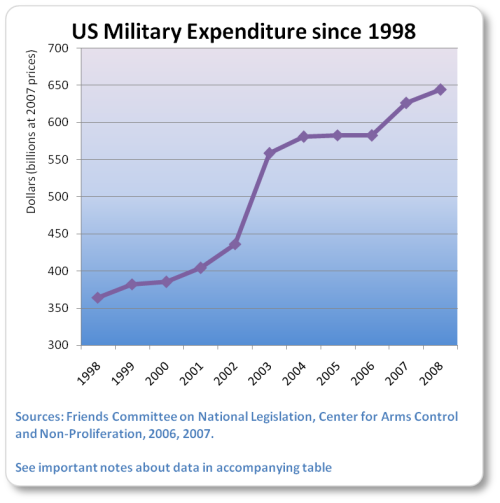
World Military Spending
http://www.globalissues.org/Geopolitics/ArmsTrade/Spending.asp

Funding the war in Iraq
http://www.sourcewatch.org/index.php?title=Funding_the_war_in_Iraq
Funding the war in Iraq -- 2006: "The Iraq war could eventually cost $2 trillion," according to a new study co-authored by Nobel Prize-winning economist Joseph E. Stiglitz and Linda J. Bilmes, "who previously presented the conservative estimate." --Cursor, January 10, 2006.
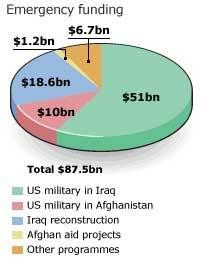
Army:
$132 million for bolt-on vehicle armor
$879 million for combat helmets, silk-weight underwear, boots and other clothing
$21.5 million for M249 squad automatic weapons
$27 million for ammunition magazines, night sights and ammo packs
$956 million for repairing desert-damaged equipment
$102 million to replace equipment lost in combat
Marine Corps:
$40 million for body armor, lightweight helmets and other equipment for "Marines engaged in the global war on terrorism"
1,800 squad automatic weapons
5,400 M4 carbine rifles


The soaring cost of war in Iraq
http://seattletimes.nwsource.com/html/nationworld/2003689462_warcost02.html
WASHINGTON — The bitter fight over the latest Iraq spending bill has all but obscured a sobering fact: The war will soon cost more than $500 billion.

That's about 10 times more than the Bush administration anticipated before the war started four years ago, and no one can predict how high the tab will go. The $124 billion spending bill that President Bush vetoed Tuesday includes about $78 billion for Iraq, with the rest earmarked for the war in Afghanistan, veterans health care and other government programs.
Congressional Democrats and Bush agree that they cannot let their dispute over a withdrawal timetable block the latest cash installment for Iraq. Once that political fight is resolved, Congress can focus on the president's request for $116 billion more for the war in the fiscal year that starts on Sept. 1.
The current spending request would push the total for Iraq to $564 billion, according to the nonpartisan Congressional Research Service.
What could that kind of money buy?
What would it buy?
Other ways to spend the $564 billion that the nonpartisan Congressional Research Service says the Iraq war is costing:
College education: Tuition, fees, room and board at a public university — for about half of the nation's 17 million high-school-age teenagers.
Preschool: For every 3- and 4-year-old in the country for the next eight years.
Assisted living: A year's stay in an assisted-living facility for about half of the 35 million Americans age 65 or older.
A college education — tuition, fees, room and board at a public university — for about half of the nation's 17 million high-school-age teenagers.
Preschool for every 3- and 4-year-old in the country for the next eight years.
A year's stay in an assisted-living facility for about half of the 35 million Americans age 65 or older.
Not surprisingly, opinions about the cost of the war track opinions about the war itself.
"If it's really vital, then whatever it costs, we should pay it. If it isn't, whatever we pay is too much," said Robert Hormats, author of "The Price of Liberty," a newly published book that examines the financing of America's wars.
Before the war, administration officials confidently predicted that the conflict would cost about $50 billion. White House economic adviser Lawrence Lindsey lost his job after he offered a $200 billion estimate — a prediction that drew scorn from his administration colleagues.
"They had no concept of what they were getting into in terms of lives or cost," said Winslow Wheeler, who monitors defense spending for the Center for Defense Information, a nonpartisan research institute.
Bush and his economic advisers defend the growing cost as the price of national security.
"It's worth it," Bush said last May, when the tab was in the $320 billion range. "I wouldn't have spent it if it wasn't worth it."
For war opponents, the escalating cost is a growing source of irritation. A Web site showing a running tally of the war's cost, http://costofwar.com/index.html, attracts about 250,000 visitors a month, according to the National Priorities Project, the site's sponsor.
"It comes down to the question, how do you want to spend a half trillion dollars? Do you want to spend a half-trillion dollars on this or would you rather spend it on something else?" said economist Anita Dancs, the organization's research director. "It's all a matter of costs and benefits."
As wars go, Iraq is cheap. World War II cost more than $5 trillion in today's dollars. World War I and Vietnam each cost about $650 billion in today's dollars, but spending on those wars took a much bigger share of the economy when they were fought.
"For the average American, there's really been no economic consequence of the country being involved in a war," said Hormats, vice chairman of Goldman Sachs (International).
"It doesn't have as much impact on the economy as those previous wars did."
But the painless approach to financing the Iraq war could cause problems in the future.
Hormats worries that the decision to cut taxes and increase domestic spending while fighting wars in Iraq and Afghanistan will complicate efforts to deal with the financial strains that threaten to bankrupt Social Security and Medicare.
Calling for sacrifice now, in a time of war, would give Americans more of a psychological stake in the long war on terrorism and prepare them for the sacrifices that will be needed to shore up Social Security and Medicare, he said.
"When you go into a war, you have to figure out how you're going to pay for it and be candid with Americans about it," Hormats said. "You can't have business as usual."
The War in Iraq and the Dollar's Slide
[Opinion] Historically, inflation was often preceded by wars
Throughout most of the Vietnam War, the U.S. dollar was fixed to the value of gold under the Bretton Woods Agreement (one ounce of gold for $35). But by 1971, as the costs of the Vietnam War skyrocketed and the U.S. financed the war by debt and an increase in the money supply (dollars), the administration under President Richard Nixon had to give up the money-for-gold guarantee. In the wake of the Vietnam War, the 1970s brought a slide in the dollar's value, not only against gold but also against the French franc and the deutsche mark, among other currencies. In 1981, one ounce of gold cost more than $800.
Today, history repeats itself: the Cost of War Web site shows that the war in Iraq has so far cost the U.S. $422 billion -- and the cost of the U.S.'s increased military budget is not completely included in that number. The Federal Reserve System under Alan Greenspan and Ben Bernanke responded to this with a dramatic increase in the money supply, which led to so-called asset price inflation: most foreign currencies, not only the euro, but also the British pound, the Indian rupee and many others, rose against the dollar. So did the value of gold, which, in terms of dollars, has almost tripled since the beginning of the war on terror.
Germans have their own, profound memories of inflations triggered by wars: The great inflation in Germany in 1923 was caused by the World War I and made possible the rise of the Nazis. World War II brought inflation and rendered the deutschemark worthless until the currency reform of 1948.
What does a crumbling U.S. dollar mean for the U.S. and the rest of the world?
First, inside the U.S., the poor become poorer and the rich become richer, since the rich can hedge their fortunes against a falling dollar. The U.S. will more and more resemble countries like Brazil and many of those in Africa where a tiny, filthy rich elite runs the country and gets all the important jobs in government and industry. An impoverished majority will be kept in ignorance and without access to healthcare and education. Falling voter turnout will render the U.S. a democracy in name only.
Second, the power of the U.S. as a center of world capitalism is weakened as gains of wealth outside the U.S. shift the gravity centers of the world economy.
The countries that benefit from a weak dollar are those that have their own strong currencies like the euro and those who have commodities like oil. Thus, Russia, Iran and Venezuela -- all foes of the U.S. -- will gain in strength and influence.
It is true that the U.S. has one asset that is stronger than all its competitors: the military. Yet the use of the United States Army in the wars in Afghanistan, Iraq and Somalia combined with the arrogance of the Bush administration and its disrespect for human rights, as Guantanamo shows, leads to hate, anger, resentment and widespread anti-Americanism everywhere outside the U.S. This may affect American trade and business.
As history shows us, empires not only rise but also fall. Following the long decline of the Roman Empire, the Arabs ruled from A.D. 500 until 1500 from Spain to India, and Malta to Tanzania. From 1500 on, Portugal and Spain commanded huge empires. Later, the Dutch and the British ruled over the majority of mankind.
The end of the British Empire coincided with the rise of the U.S. as a superpower. Now, the United States' superpower status is fading away, as the war in Iraq war marks the end of an era.
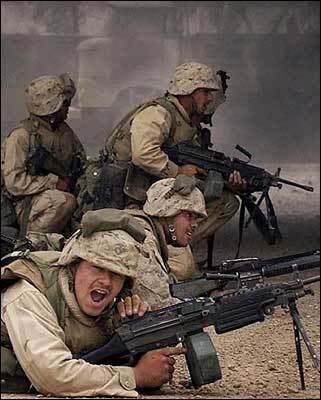
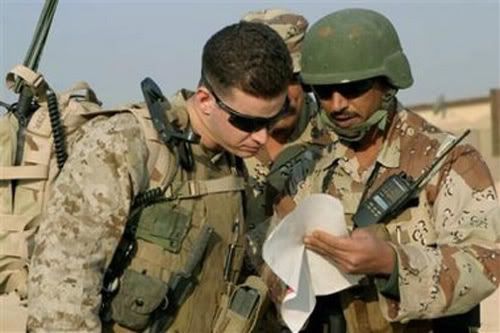
Bush Vetoes War Funding Bill With Withdrawal Deadline
May 1 (Bloomberg) -- President George W. Bush, using his veto power for only the second time in his presidency, rejected military funding legislation that would have set a timetable for the U.S. to pull combat troops from Iraq.
http://www.bloomberg.com/apps/news?pid=20601087&sid=a0saUK_V2AAM&refer=home
``Setting a deadline for withdrawal is setting a date for failure,'' the president said in a statement at the White House. Putting restrictions on U.S. commanders from Washington is a ``prescription for chaos and confusion, and we must not impose it on our troops.''
Bush issued the veto immediately upon returning to Washington from a speech to military commanders at the U.S. Central Command headquarters in Florida and a little more than three hours after Democratic leaders in Congress staged their own ceremony to send the bill from the Capitol.
While House Speaker Nancy Pelosi argued that the legislation ``respects the wishes of the American people to end the Iraq war,'' Democrats don't have enough votes to override Bush's veto and force the administration to pull out of Iraq.
Bush will meet with Democratic and Republican lawmakers at the White House tomorrow to begin hashing out a compromise that will provide about $100 billion that the Defense Department needs to carry out operations in Iraq and Afghanistan for the rest of the year.
Bush said he is ``confident'' that the administration and Congress can come to terms on a measure that will provide the money.
``The president wants a blank check,'' Pelosi said after Bush's veto. ``The Congress is not going to give it to him.''
Benchmarks
Lawmakers have said Congress likely will ultimately drop the withdrawal timetable and instead set political and security benchmarks for the Iraqi government to meet. Some U.S. aid to Iraq might be tied to Iraqi leaders meeting the conditions. Senator Mitch McConnell of Kentucky, the Republican leader in the chamber, said today that ``some kind of benchmarks, properly crafted, would actually be helpful.''
White House Press Secretary Tony Snow said the Iraqis already have benchmarks to meet. The administration won't accept ``anything that jeopardizes the government of Iraq or weakens the ability of our forces to succeed.''
Today's transmittal of the legislation to the White House and Bush's veto were part of process that both sides intricately staged for maximum political effect.
Anniversary
Democratic leaders sent the bill to Bush five days after passage on the fourth anniversary of the president's appearance on the deck of the aircraft carrier USS Abraham Lincoln to mark the fall of Saddam Hussein's regime. Under a banner proclaiming ``Mission Accomplished,'' Bush announced that day that ``major combat operations in Iraq have ended.''
The lightning victory over Hussein's military after the March 2003 invasion has been followed by four years increasing violence by sectarian militias, insurgents and terrorists and the deaths in combat of 2,616 U.S. military personnel.
Senate Majority Leader Harry Reid said Bush ``has put our troops in the middle of a civil war'' in Iraq. ``Reality on the ground proves what we all know, a change of course is needed,'' he said at a joint appearance with Pelosi.
Anti-war allies of the Democrats planned events, press conferences and advertisements to coincide with Bush's veto. One anti-war group, AmericansUnitedForChange.org, has made a 30- second television ad juxtaposing excerpts of Bush's ``Mission Accomplished'' speech with videos of explosions in Iraq.
Snow called the Democrats' timing ``cynicism accomplished.''
Veto Pen
Bush signed the veto using a pen given to him by Robert Derga, the father of Marine Corps Reserve Corporal Dustin Derga, who was killed May 8, 2005, in combat in Iraq's Anbar province. Derga gave the president the pen during an April 16 meeting and asked him to use it when issuing the veto.
To make his point that the war is part of a worldwide battle against terrorism, Bush this morning traveled to MacDill Air Force Base in Tampa, Florida, to thank U.S. allies in the fight in Iraq and Afghanistan.
Speaking to military officers from more than 30 nations and officers of the U.S. Central Command, Bush said the coalition is engage in a ``noble'' and ``necessary'' cause.
``Failure in Iraq should be unacceptable in the civilized world; the risks are enormous,'' he said. While he didn't mention Democratic demands for a timetable for withdrawal, he said pulling back would ``risk turning Iraq into a caldron of chaos.''
Bush, in his White House statement, also said he objected to the inclusion of spending for domestic projects not related to the war.
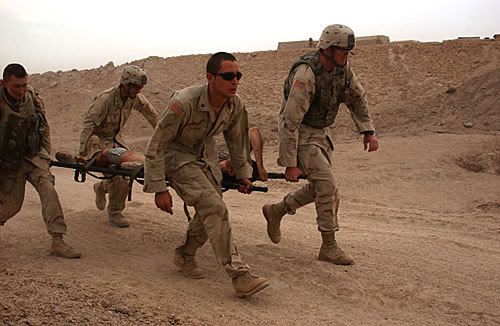
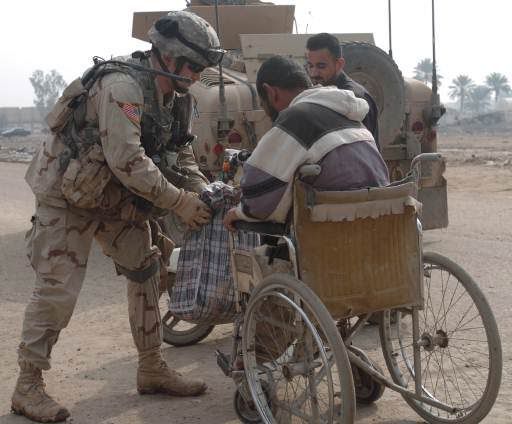
Disaster funding part of military measure
http://www.greeleytrib.com/article/20070426/NEWS/104260121
An amendment providing agriculture disaster funding has been added to the U.S. Senate bill that provides $100 billion in funding for the military fighting the war on terrorism in Iraq and Afghanistan.
And U.S. Sen. Ken Salazar, D-Colo., in a conference call Wednesday morning said an amendment addressing safety on U.S. college campuses, in response to the massacre at Virginia Tech last week, also was added to an education bill that is moving through the Senate. That measure, Salazar said, would require colleges and universities to conduct an annual campus safety assessment and develop an emergency response plan.
The $100 billion military funding bill proposed by the Senate would provide for additional funding to the National Guard, new equipment, which would better protect soldiers from roadside bombs, better health care for veterans returning home from the war and for homeland security, and is more than President Bush had requested from Congress, Salazar said.
The amendment seeking disaster aid for farmers and ranchers reeling from the effects of seven years of drought, winter blizzards and other weather-related problems, is part of $10 billion the Senate is seeking for aid to those hit by Hurricanes Rita and Katrina. About $3.5 billion of that amendment would go toward agriculture disaster aid, Salazar said. He added that areas, such as eastern Colorado, hit hard by winter blizzards have not received federal help even though they were declared a federal disaster area.
"We have been trying to get agriculture disaster aid for the past two years, but the Republican-controlled House has killed those bills," Salazar said, noting that while there are Senators who understand the plight of rural America, there are few in the House who share the same views. He expressed hope that with the Democrats controlling the House, aid may be forthcoming.
Salazar said the Senate version of military funding differs from that in the House, in that the Senate bill does not have a firm withdrawal date from Iraq but instead talks about the redeployment of combat units starting by April 1, 2008. The president has threatened to veto any bill that has withdrawal wording, and Salazar said he doubted if there were enough votes in Congress to override any veto.
"I think this is a good bill, and I hope the president signs it," Salazar said, noting the bill is designed with recommendations from the Iraq Study Group, a bipartisan group that included what Salazar called some of the more "elder statesmen" in the nation.
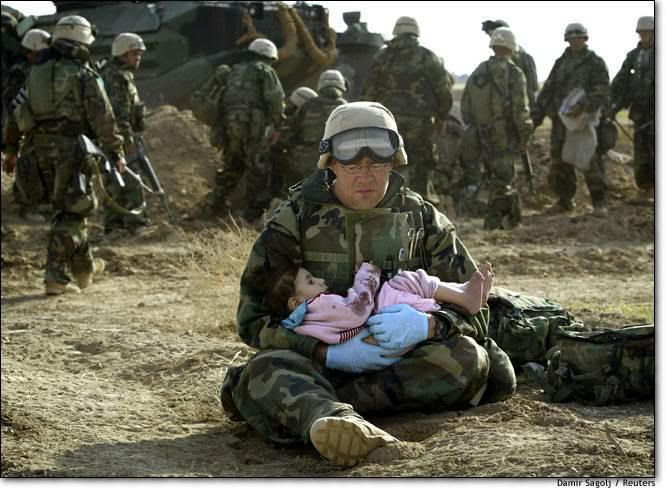
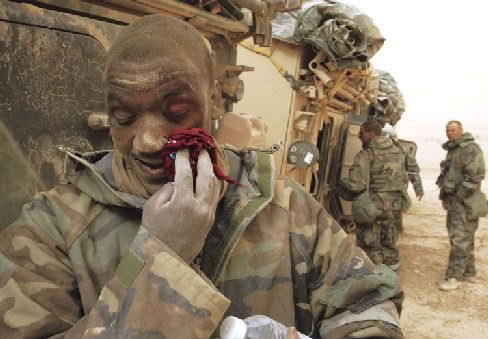

Soldiers' wages to run out
MONEY for US soldiers in Iraq will begin to run out in July after President Bush vetoed a Democrat Bill that would have started to bring them home.
http://www.news.com.au/heraldsun/story/0,21985,21662015-663,00.html
While both sides pledged to work together on new legislation to ensure US troops in Iraq and Afghanistan get needed funding, there was no sign of a compromise between the White House and Congressional Democrats, who have sought to tie funding to a pull-out schedule.
"Members of the House and Senate passed a Bill that substitutes the opinions of politicians for the judgment of our military commanders, so a few minutes ago, I vetoed the Bill," Mr Bush said yesterday.
The President said the Bill would demoralise Iraqis and encourage killers across the Middle East.
"Setting a deadline for withdrawal is setting a date for failure, and that would be irresponsible," he said.
"It makes no sense to tell the enemy when you plan to start withdrawing. All the terrorists would have to do is mark their calendars and gather their strength and begin plotting how to overthrow the Government and take control of the country of Iraq."
Mr Bush had long pledged to defy the Democrat-controlled Congress with a veto of the Bill, which was to allocate $US124 billion in emergency funding for US troops in Iraq and Afghanistan.
The measure linked the funds to a call for troops to start coming home by October 1, with most out by March, 2008.
House Speaker and Democrat Nancy Pelosi said: "We look forward to working with the President to find common ground, but there is great distance between us right now," she said.
Democrats in Congress appear not to have enough votes to override Mr Bush's veto.
The Senate Minority Leader, Republican Mitch McConnell, suggested less strict "benchmarks" could be a point of compromise.
Caught between competing public sympathies that want the war ended and the troops funded, Democrats found themselves struggling to satisfy both concerns.
"It's too early to tell the best way to do it," said New York Senator Chuck Schumer. "We're going to go back to the President and try to figure out another way to do the same thing, which both supports the troops but changes the direction and the mission in Iraq," he said.
Democrats estimate the troops will start feeling the pinch in early July if funding is not passed.
Democrats and moderate Republicans have been weighing several options: a "clean" Bill with no strings attached, non-binding benchmarks for the Iraqi regime, and funding in smaller chunks.
Democrat leaders are determined to pass funding and seemed to be leaning toward softer benchmarks. "We will fund our troops," said Representative Joe Crowley.
Democratic congressional leaders waited to present the Bill to Mr Bush on the fourth anniversary of a speech in which he prematurely declared an end to major hostilities in Iraq.
The President vetoed the Bill with a pen given to him by the father of a Marine killed in Iraq.
The veto came as an al-Qaida-linked group denied reports of insurgent Abu Ayyub al-Masri's death.
GEOFF Hoon, the British defence secretary during the March 2003 invasion of Iraq, told the Guardian newspaper that Britain and the US had not properly planned what would happen after the invasion.

http://www.grooveking.com/images/taxes.jpg
Battle over Iraq war funding rightly takes center stage in Washington
http://www.thestate.com/168/story/52404.html
The following editorial appeared in the Raleigh (N.C.) News & Observer on Sunday:
Just months after taking control of Congress on a surge of anti-war feeling, Democrats have forced a showdown with President Bush over the Iraq war. For both sides the showdown has elements of show — a puffing up over prerogatives, a bit of ritual intransigence before a bow to inevitable compromise. One way or another, money for the troops will continue to flow, for now.
Nevertheless, this week’s conflict in Washington causes Americans to consider how the war in Iraq will turn out. It was time we talked about this.
Thursday’s Senate vote for a war spending bill — with an Oct. 1 deadline to begin troop withdrawals — followed a similar debate in the House. Votes closely followed party lines; Democrats for deadlines, Republicans opposed. The president pledges a veto. That could come Tuesday, the four-year anniversary of Bush’s “Mission Accomplished” flight-deck triumph.
Mindful of the timing, the White House called the Democratic stance “Mission Defeated.” Republicans label troop-withdrawal deadlines “surrender.” Democrats say they’re a signal to the Iraqi government of the need for rapid progress, and that most Americans believe the war, with 3,300 service personnel killed over four years, must start winding down.
Indeed it must. The public’s patience for troop losses is not unlimited, nor is the public purse — Iraq is costing us about $2 billion a week. The military has been drained by too-frequent deployments and a long, grinding occupation.
So deadlines or not, troops will eventually leave; the new Iraq will stand or fall, either as the bastion of democracy and peace Bush envisions, or as something more chaotic and sinister. Either way, credit goes to the U.S. military, which expeditiously defeated Saddam Hussein’s forces in 2003 and has been stationed on difficult terrain ever since. This week’s drama in Washington is about the story of how the war winds down, not whether it will.
Democrats want credit for forcing the administration to retreat. They see the war as a misguided (at the least) and overreaching affair waged ineptly and for too long. The president and his allies persevere in seeking victory — which they define as an insurgency defeated, a blow dealt to Islamic terror, a safer Middle East created. They’re banking on a “surge” of forces to quiet the Baghdad area.
But time is short, and not just because Democrats say troops should start coming home by Oct. 1 and be all out by a year from now. Gen. David Petraeus, the president’s chosen surge commander, told Congress on Thursday that he’ll make a formal evaluation of how it’s working in September. Noting the complexities of Iraq’s intertwined conflicts, he warns, “This effort may get harder before it gets easier.”
If forecasts for a hot and deadly summer prove out, Petraeus’ September review could be the only one he gets to make. Unless he can show heartening progress — meaning fewer U.S. troops are needed — public opinion may pull the plug. With an election year looming, even Republican officeholders will want an exit strategy.
That means the general’s September review and Democrats’ Oct. 1 deadline are not so far apart. A drawdown beginning in early autumn seems likely. Meantime, Iraqis are on notice that congressional majorities demand change. Political accommodation among Iraqis is the only path to peace, so Congress is right to put on the pressure.
The Cost of War
The Price of War
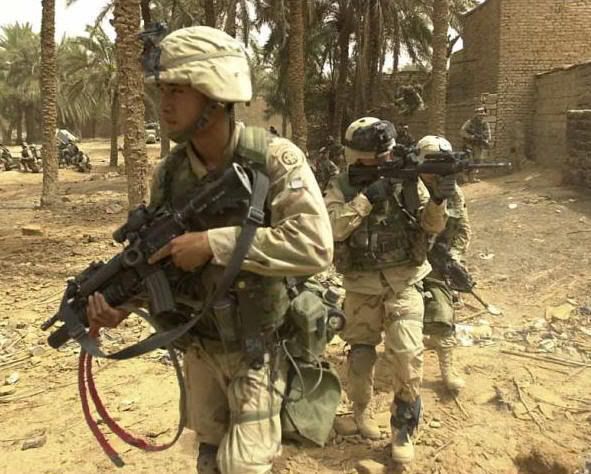












![Brotherhood" (2006) [TV-Series]](http://photos1.blogger.com/x/blogger2/1421/379621144723082/211/z/425926/gse_multipart33129.jpg)







No comments:
Post a Comment